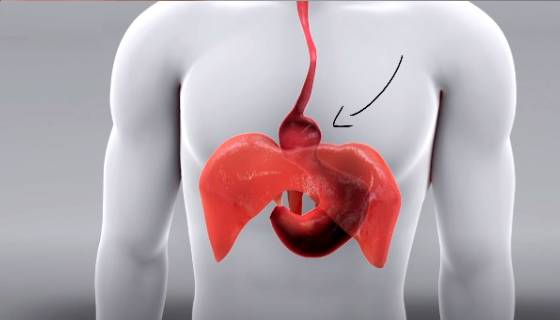- Sliding Hiatal Hernia:
-
- In this type, the stomach and the lower part of the esophagus slide up into the chest through the diaphragm.
- It is the more common form of hiatal hernia.
- Paraesophageal Hernia:
-
- Considered more dangerous, the esophagus and stomach remain in their normal positions, but part of the stomach protrudes through the hiatus beside the esophagus.
- This type may lead to complications such as a strangulated hernia, where the stomach’s blood supply is compromised.
Symptoms of Hiatal Hernia:
While many people with hiatal hernias remain asymptomatic, others may experience symptoms such as:
- Heartburn from gastroesophageal reflux disease (GERD)
- Chest pain
- Bloating
- Burping
- Trouble swallowing
- Unpleasant taste in the mouth
- Upset stomach and vomiting
- Backflow of food or liquid into the mouth
- Shortness of breath
Seek immediate medical attention if you experience severe chest or abdominal pain, persistent upset stomach, vomiting, or difficulty with bowel movements or passing gas, as these may indicate a strangulated hernia or obstruction, both of which are medical emergencies.
Causes and Risk Factors:
- The exact causes of hiatal hernias are not fully understood.
- Factors may include congenital factors, injury to the area, age-related changes in the diaphragm, and increased abdominal pressure from conditions like pregnancy, obesity, coughing, heavy lifting, or straining during bowel movements.
Diagnosis:
To diagnose a hiatal hernia, doctors may conduct tests such as:
- Barium swallow (X-ray imaging after drinking a contrast liquid)
- Endoscopy (using a thin tube with a camera to examine the esophagus and stomach)
- Esophageal manometry (measuring pressure in the esophagus during swallowing)
- pH test (measuring acid levels in the esophagus)
- Blood tests to check for anemia if a concern exists.
Treatment:
- Most asymptomatic hiatal hernias do not require treatment.
- For those with acid reflux, medications like antacids, proton pump inhibitors, H-2 receptor blockers, or prokinetics may be recommended.
- Surgery may be considered for paraesophageal hernias to prevent strangulation. Surgical techniques, often done laparoscopically, reinforce the hiatus and reposition the stomach.
Overall, treatment decisions are tailored to individual symptoms and the type of hiatal hernia present.

